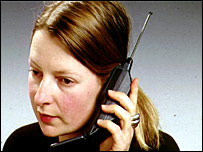|
The admission of Clive Goodman, of the News of the World, and Glenn Mulcaire to conspiracy to intercept royal voicemail messages has cast the spotlight on a shadowy practice.
How easy is it to do this to a mobile phone, and what are the methods employed?
How can a mobile phone be tapped?
According to security expert Mark Cooper there are three methods by which a mobile telephone can be intercepted.

Analogue phone systems could be accessed through scanners
|
This can be done either at the handset, or during the conversation - which is illegal and very expensive - or through the mobile phone company which connects the device.
If tapping is difficult, is it any easier to access voicemail?
A mobile phone that is switched off can have its voicemail accessed by a third party who calls into it by using a special code.
Is it possible to guard against this type of intrusion?
It is good practice to delete voicemail once it has been listened to and change any default voice message access code to another number.
And if you are a person in a high-profile position, Mr Cooper's advice is to not leave messages on other people's mobile phones.
Why are digital telephone systems more difficult to access than the old analogue ones?
Analogue phone systems, which have now been switched off in the UK, were essentially radio systems that could be tuned into by someone with a scanner.
Digital systems are scrambled and encoded. It is possible to tune into them while a conversation is taking place - but it is a difficult process.
The only organisations which carry this out are the nation's security forces.
It is much easier and cheaper to access voicemail messages, a method which is relatively straightforward.
Are there laws preventing people from tapping into someone's telephone?
It is illegal to gain access to another person's telephone under Section 1 of the Regulation of Investigatory Powers Act 2000 (RIPA).
Legal affairs analyst Jon Silverman said the only exception is if the tapping is being done by the authorities, who will have gained legal clearance.
He said: "The RIPA act was a controversial one. The government wanted to put on a statutory footing the activities of bodies like the police, MI5 and security agencies generally.
"It raises the question of the very buoyant market for confidential information in this country and the biggest buyers are the media."
What are the penalties for breaking the law in this way?
The maximum sentence is two years in prison, or a fine, or possibly both.
What other illegal methods are used to obtain personal information?
Some journalists have been known to pay police, private investigators and other sources for information about celebrities and public figures.
Addresses, phone call records and bank account statements are among the details sought.
Supervisory authority the Information Commissioner's Office highlighted the trade in May this year in the report What Price Privacy?
It believes the current non-custodial penalties under the Data Protection Act are not a sufficient deterrent to stop the trade.
Many journalists, however, say they only resort to such measures when pursuing stories in the public interest.
|
Bookmark with:
What are these?